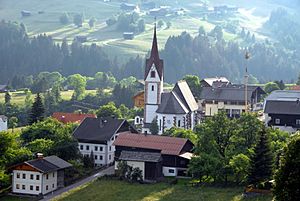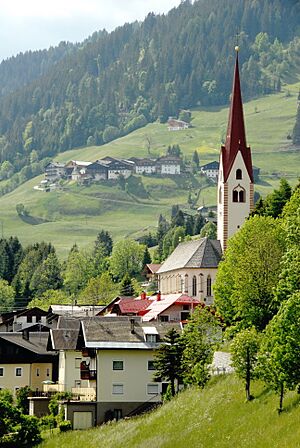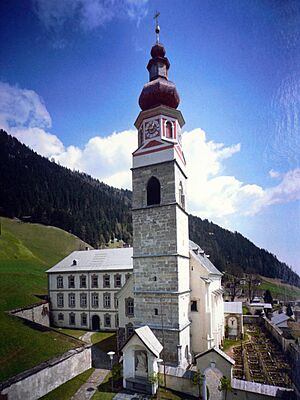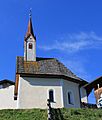Lesachtal facts for kids
Quick facts for kids
Lesachtal
|
||
|---|---|---|

Liesing
|
||
|
||
| Country | Austria | |
| State | Carinthia | |
| District | Hermagor | |
| Area | ||
| • Total | 190.75 km2 (73.65 sq mi) | |
| Elevation | 1,044 m (3,425 ft) | |
| Time zone | UTC+1 (CET) | |
| • Summer (DST) | UTC+2 (CEST) | |
| Postal code |
9653
|
|
| Website | [1] | |
Lesachtal (which means "Lesna Valley" in Slovenian) is a small town in the Hermagor District of Carinthia, an Austrian state. It's located in the western part of a valley formed by the upper Gail River. The area stretches from the border with East Tyrol all the way to Kötschach-Mauthen in the east.
Contents
Geography of Lesachtal
The Lesach Valley is found in the southwest part of Carinthia. The very top part of the Gail River, which continues into East Tyrol, is known as the Tilliach Valley. The eastern section of the Lesach Valley, around the village of Sankt Jakob, belongs to the nearby Kötschach-Mauthen municipality.
The valley is quite narrow. To the north, it's bordered by the Lienz Dolomites, which are part of the Gailtal Alps. To the south, you'll find the Carnic Alps, with peaks like Mt. Hohe Warte (also called Coglians in Italian), which is about 2,780 meters (9,120 feet) high. These mountains form the border with Italy. Most of the towns and paths in Lesachtal are on the northern slopes, about 300 meters (980 feet) above the deep Gail River gorge.
The municipality of Lesachtal covers an area of about 190.75 square kilometers (73.65 square miles). It includes several smaller areas called cadastral communities: Kornat, Liesing, Maria Luggau, and Sankt Lorenzen im Lesachtal.
Language in Lesachtal
The way people speak in the Lesach Valley is quite interesting. The local dialect is a type of Southern Bavarian German, but it's more like the dialect spoken in East Tyrol, with only small differences. You can also hear some words and phrases from the Slovenian language that have stayed in common use over time.
History of Lesachtal
The name Lesach Valley comes from a Slavic word, les, which means 'forest'. Around the year 600 AD, Slavic people settled in this valley. In the 8th century, it was one of the first valleys in the Principality of Carantania (an early Slavic state) to become more German. This happened after Prince Boruth agreed to be under the rule of Duke Odilo of Bavaria around 740 AD.
In 1380, the Lesach area, which had its own court (called Landgericht Lesach), became part of the Pittersberg lordship. This lordship was named after a nearby castle and was an important administrative center. It was controlled by the Meinhardiner Counts of Gorizia from East Tyrol. When their family line ended, the last countess, Margaret, gave the lordship to the ruling princes of the House of Habsburg in 1363. Later, it was taken over by the Carinthian Counts of Ortenburg.
In 1850, when Austrian municipalities (local governments called Ortsgemeinden) were created, three main towns in the valley – Luggau, Sankt Lorenzen, and Liesing – became their own municipalities. Other areas, like Kornach and Strajach, first joined with Mauthen. But in 1882, they became independent as the municipality of Unterlesach. Ten years later, the villages of Birnbaum and Sankt Jakob also became independent. However, in 1973, during a local government change in Carinthia, the eastern Lesach municipality of Sankt Jakob joined with Kötschach-Mauthen. The four western municipalities were then combined to form the current municipality of Lesachtal.
During World War I, from 1915 to 1918, the Italian front was located on the ridge of the Carnic Alps. This was where the Austro-Hungarian Army and the Royal Italian Army fought. You can still see many old positions and forts that show where this difficult mountain war took place.
Population of Lesachtal
According to a census in 2001, Lesachtal had 1,560 people living there. Most of them (98.4%) were Austrian citizens, and a small number (1.3%) were German citizens. The total number of people living in Lesachtal has been getting smaller over the past few decades.
Most people in Lesachtal are Roman Catholic (98.4%), and a smaller number (1.2%) are Protestant.
Notable people from Lesachtal
- Matthias von Lexer (1830–1892), a famous person who created dictionaries.
Gallery
See also
 In Spanish: Lesachtal para niños
In Spanish: Lesachtal para niños
 | Sharif Bey |
 | Hale Woodruff |
 | Richmond Barthé |
 | Purvis Young |
















